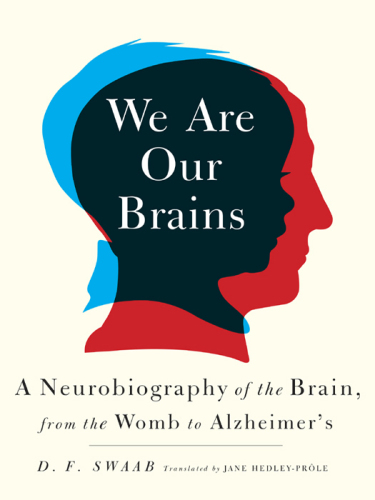
We Are Our Brains
A Neurobiography of the Brain, from the Womb to Alzheimer's
کتاب های مرتبط
- اطلاعات
- نقد و بررسی
- دیدگاه کاربران
نقد و بررسی

Starred review from October 28, 2013
How the brain works is one of modern science’s great questions, and Dutch neurobiologist Swaab, in sharing his 45 years of collected wisdom, reveals the organ as a living being in and of itself. It’s a fascinating survey and though Swaab embraces the impossibility of arriving at scientific conclusions, he never lacks for carefully selected information. Broadly speaking, the book is organized chronologically, examining the brain from birth into adolescence, through adulthood and, finally, to death. Disorders, which provide incredible insights into normally functioning brains, are included in most sections. Swaab employs both personal and scientific observation in near-equal measure. Sometimes the first person perspective can result in questionable conclusions; for example, Swaab’s chapter on sports and the brain seems to come down unnecessarily hard on athletics, and takes with a grain of salt significant research into the neurological benefits of sports. Nevertheless, as the author makes clear early on, his insights are not conclusions. They are instead compelling starting points, collectively working—as we learn neurons do—to build a comprehensive, functional picture of the human brain. Illus.

December 1, 2013
Modern scientific research has provided new insight into how the brain works at every stage of life and how chemical processes in the brain affect who we are and how we interact with each other. Prominent neuroscientist Swaab (Neurobiology/Amsterdam Univ.) is an ideal tour guide to these developments, taking readers chapter by chapter through a human life span of the brain. A complex and often mysterious organ, the brain has been subject to study for centuries, and yet new discoveries are announced all the time due to increasingly sophisticated experimental methods. Using case studies, historical texts and experience gained from a career in brain research, the author treads some controversial ground in his conclusions. Importantly, he argues that free will may not be absolute and that the brain may be wired to predetermine key aspects of human behavior. For example: When we fall in love, is it a demonstration of free will or a chemical imperative beyond our conscious control? Swaab also suggests that factors like homosexuality and addiction--which have often been cited as individual choices--are instead hard-wired into our brains and therefore beyond our control. The physical changes in the brain's circuitry during adolescence or parenthood also suggest predetermination. Accompanying these revelations are technological advances that may be able to treat devastating brain disorders like schizophrenia and Alzheimer's disease and other forms of dementia. Deep-brain stimulation, neuroprostheses, gene therapy and stem cell transplants are some of the cutting-edge treatment options that could represent the future of brain health. The author advocates for an increased awareness of the social significance of brain research and writes passionately about its huge potential for a greater understanding of ourselves as human beings. A cogent, provocative account of how 21st-century "neuroculture" has the potential to effect profound medical and social change.
COPYRIGHT(2013) Kirkus Reviews, ALL RIGHTS RESERVED.

Starred review from December 15, 2013
The human brain weighs a modest three pounds and has an energy consumption equivalent to a lowly 15-watt electric lightbulb. But it also comprises 100 billion nerve cells (neurons) and boasts amazingly complex hard-wiring (1,000 times 1 billion neuronal connections). Dutch physician and neuroscientist Swaab artfully explains how the organ's design and functioning are a biological masterpiece as well as the source of our mind and identity. Brain research is genuinely a quest to find ourselves. Swaab probes the normal psychology, anatomy, and physiology of the brainearly development, intelligence, memory, moral behavior, neurochemistry, and consciousness. He also explores how the brain malfunctionsautism, schizophrenia, Parkinson's disease, anorexia nervosa, vegetative states, and dementia. When it comes to love and sex, the brain is clearly the boss: Sex starts and ends in the brain, Swaab writes. The brain provides orgasm as a reward. He describes Alzheimer's disease as a demolition of the brain and the sport of boxing as neuropornography. The most interesting and controversial chapter is Neurotheology: The Brain and Religion. Here he postulates that praying might be a placebo for oneself and notes that the score for spirituality matches up with the quantity of serotonin receptors in the brain. Swaab's neurobiography is witty, opinionated, passionate, and, above all, cerebral.(Reprinted with permission of Booklist, copyright 2013, American Library Association.)

























دیدگاه کاربران